Blog
- 2020-09-22 16:38:02
- admin
There are four or so DC Fast Charging systems currently being used by EV charging manufacturers. The article shown here has four different EV connectors .
At the current moment the leading car for each type is:
●CHAdeMO – Nissan Leaf
● CCS – BMW i3
● Supercharger – Tesla Model S
● China GB/T
Let’s take a look at each.
CHAdeMO – (Nissan, Mitsubishi, Kia)
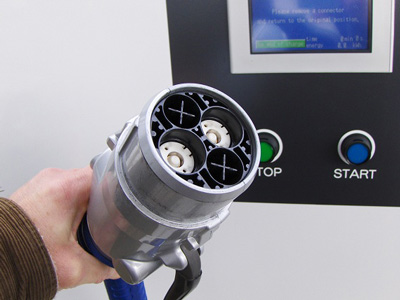
CHAdeMO is the trade name of a quick charging method for battery electric vehicles delivering up to 62.5 kW of high-voltage direct current via a special electrical connector. It is proposed as a global industry standard by an association of the same name.
It was defined by the CHAdeMO Association – Purpose/focus CHAdeMO Association aims to increase quick-charger installations worldwide and to standardize how to charge the vehicles. – CHAdeMO was formed by The Tokyo Electric Power Company, Nissan, Mitsubishi and Fuji Heavy Industries (the manufacturer of Subaru vehicles). Toyota later joined as its fifth executive member. CHAdeMO is an abbreviation of “CHArge de Move”, equivalent to “charge for moving”. The name is a pun for “O cha demo ikaga desuka” in Japanese, translating to English as “How about some tea?”, referring to the time it would take to charge a car.
CHAdeMO charger is a form of DC Fast Charger, for high-voltage (up to 500 VDC) high-current (125 A)automotive fast charging via a JARI DC fast charge connector. The connector is specified by the JEVS (Japan Electric Vehicle Standard) G105-1993 from the Japan Automobile Research Institute. The connector includes two large pins for DC power, plus other pins to carry CAN-BUS connections.
Because CHAdeMO ports do not support AC charging, cars must have two charging ports – one for AC Level 2, the other for CHAdeMO.
SAE Combo Charging System (CCS) – (BMW, GM, VW, and other carmakers)
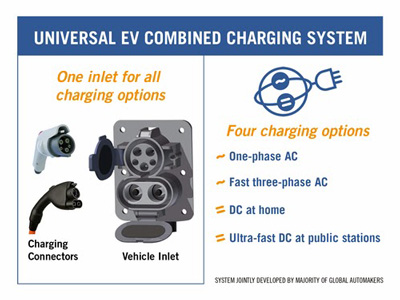
When tasked with developing a fast charging system, the SAE J1772 committee basically took the existing J1772 plug and added on two large pins for high power DC. The upper part is the ordinary J1772 plug used in the USA, and the lower portion are the two DC power pins.
Among the reasons the J1772 committee developed CCS are
★Single charging inlet to support slow and fast charging (versus two required for CHAdeMO)
★Use smart grid protocols to control charging
★Same connector serves multiple purposes
The first point allows car makers more design freedom by requiring only a single hole in the skin of the car (or, a smaller hole) for recharging. The charging cord is also lighter weight than the CHAdeMO, and easier to use.
The second point – see the image above labeled “IEC DC Charging Systems” – has to do with the control protocol between the car and the charging station. We’ll discuss this below, but CCS uses PLC for that communication, whereas CHAdeMO uses CAN. CAN is a data protocol used between components inside cars, while PLC is part of the smart grid protocols.
Tesla Supercharger
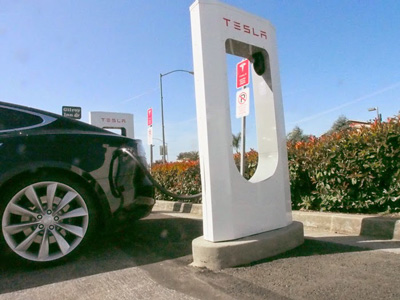
The Tesla Supercharger system uses a single port supporting, using a sleek slender cable and charging connector, every possible charging situation one can think of:
◆The Tesla mobile charging unit comes with adapters for every kind of power outlet, from 120 volt 12 amp (NEMA 5-20), through to 240 volt 50 amp (NEMA 14-50).
◆Via an adapter, it can connect to J1772 charging stations
◆At a Supercharger station (pictured above) it can receive DC fast charging at up to a 120 kiloWatt rate
It means a Tesla Model S or Model X owner can get rapid charging in a wide range of situations.
Tesla Motors also sells an add-on adapter allowing a Model S/X owner to recharge at a CHAdeMO station. Tesla Motors does not sell any kind of adapter allowing owners of CHAdeMO or CCS cars to recharge at a Supercharger station, however.
China’s fast charging system(s)
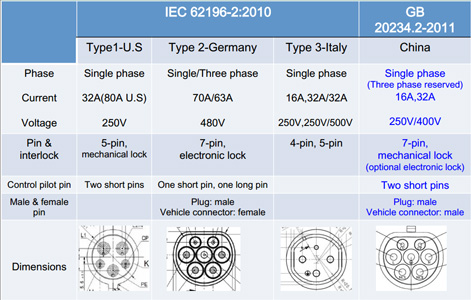
![]()
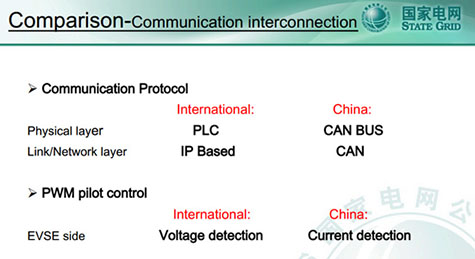
Sicon Products
>> EVDS DC Fast Charging Pile
>> DPM DC Charging Module ( DSP Technology, Efficiency 95%)
>> EVTS DC Charging Station (Multiple Outlets, Wide Range of AC Power Input)
Sicon Solution
>> EV Charging Solution
Sicon Enterprise Video & Sicon Online Show Room
Contact Sicon Team
Tel: 86-311-85903762
 global
global











